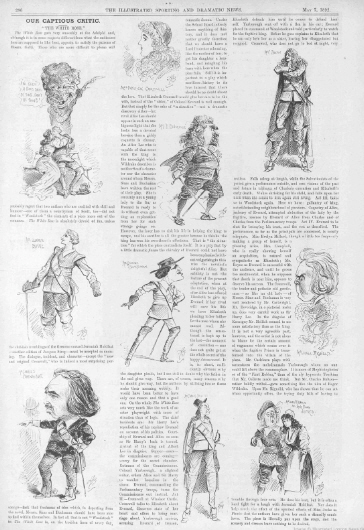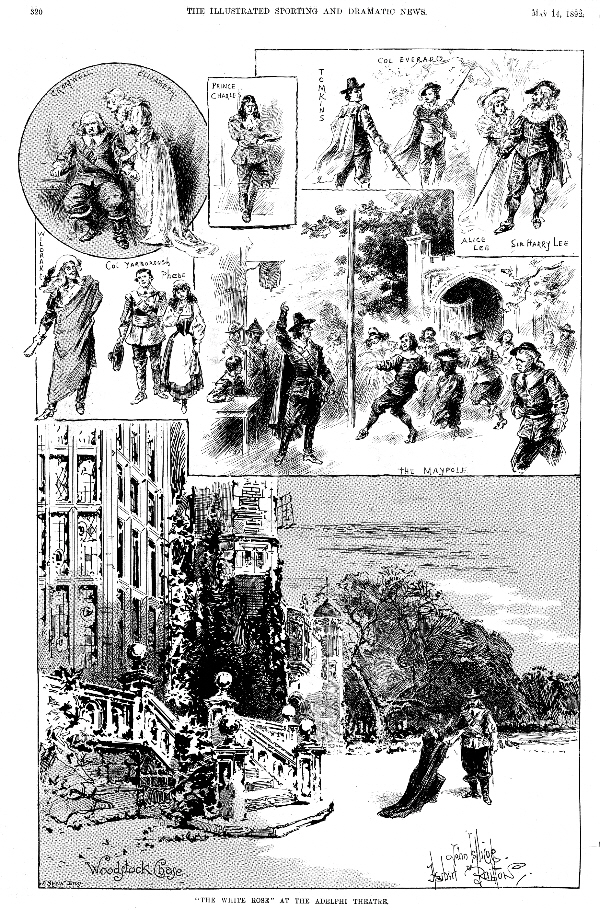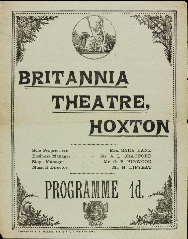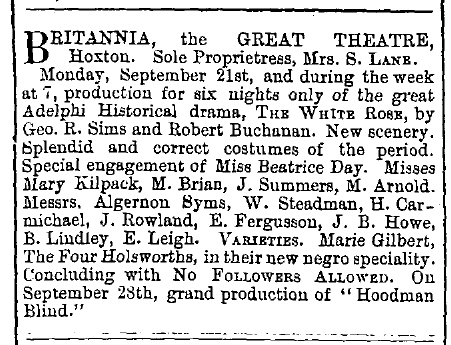|
Play List: 4. Corinne 7. The Mormons 9. Lucy Brandon 10. Storm-Beaten 11. Lady Clare 13. Bachelors 14. Constance 15. Lottie 16. Agnes 17. Alone in London 18. Sophia 19. Fascination 20. The Blue Bells of Scotland 21. Partners 24. Angelina! 25. The Old Home 26. A Man’s Shadow 27. Theodora 29. Clarissa 30. Miss Tomboy 32. Sweet Nancy 33. The English Rose 36. Marmion 37. The Gifted Lady 38. The Trumpet Call 39. Squire Kate 40. The White Rose 42. The Black Domino 44. The Charlatan 45. Dick Sheridan 47. Lady Gladys 48. The Strange Adventures of Miss Brown 49. The Romance of the Shopwalker 52. Two Little Maids from School ___ |
|
ROBERT WILLIAMS BUCHANAN (1841 - 1901) |
|
|
|
|
|
|
|
|
THEATRE REVIEWS 40. The White Rose (1892) - continued
The Illustrated Sporting and Dramatic News (7 May, 1892 - p.22) OUR CAPTIOUS CRITIC. |
 |
|
The Illustrated Sporting and Dramatic News (14 May, 1892 - p.12) “THE WHITE ROSE” AT THE ADELPHI THEATRE. OUR artists have sketched from this romantic drama the effective scene outside Woodstock Manor House with Alice pleading to Cromwell for her lover’s life. Other incidents shown are a scene between Cromwell and his daughter; the quarrel between Sir H. Lee and Tompkins stopped by Everard; Tompkins and Phœbe; the dance of the peasantry while the soldiers are in Conventicle; the fugitive King about to take to the secret chamber with a meat pie to fall back upon, &c., &c. (p.20) |
 |
|
[Click the picture for a larger version.]
Boston Evening Transcript (16 May, 1892 - p.7) MUSIC AND DRAMA. A New Play on a Scott Romance. (Regular Correspondence of the Transcript.) LONDON, May 7. ___
The Theatre (1 June, 1892) Our Play-Box. “THE WHITE ROSE.” Romantic drama, in four acts, founded on Sir WALTER SCOTT’S novel “Woodstock,” by |
|
|
|
Melodrama has for so long a time reigned at the Adelphi, that some little curiosity was aroused as to whether Messrs. Gatti’s patrons would accept in its place romantic drama in the form of a costume play. The departure, to all appearances, has been a successful one, for the house is nightly crowded. Following in the main Sir Walter Scott’s novel, Messrs. Sims and Buchanan have imported into their work (in the greater portion of two acts) entirely fresh incident, growing out of the aspect under which they present Oliver Cromwell’s character, that of a sympathetic almost mystic enthusiast, the one great passion of his life being the love he bears his daughter Elizabeth. But little attention has been paid to historical record as far as these characters are concerned, and in lieu of Colonel Markham Everard being made a tool by Cromwell, he is one of his most trusted and beloved lieutenants. Colonel Everard is in love with Alice Lee, and befriends her father when Woodstock is confiscated by the Parliamentary Commission. He drives out Colonel Yarborough when he comes to take possession, and for this is summoned before Cromwell to explain his conduct. Elizabeth Cromwell, who is deeply attached to Everard, pleads his cause, and Cromwell, who has learnt her secret and wishes to see her happy, bestows even greater favours on Everard. Albert Lee introduces to his father’s house as a fugitive (representing him as a young Scotch nobleman) Charles Stuart, who is endeavouring to escape over seas. The vicious king makes love to his generous host’s daughter, confides to her who he really is, and is pressing on her his dishonourable proposals when they are interrupted by the entry of Colonel Everard. He draws upon Charles, when Alice rushes between them announcing that his opponent si the King. Everard, though a Roundhead, has always looked upon the execution of Charles I as a murder; he will not be a party to the capture of the young king, and he passes him through the lines, and, denounced by Colonel Yarborough, is condemned to death by Cromwell. Elizabeth again pleads his cause, and after a severe struggle in Cromwell’s mind, obtains not only his pardon, but smooths the way to his marriage with Alice Lee. Mr. Charles Cartwright gave a very powerful rendering of the Cromwell that the authors drew, and in the scene of the dream in which he is supposed to witness the execution of Charles I, and the subsequent death of his beloved daughter, he fairly brought down the house. Mrs. Patrick Campbell’s Elizabeth Cromwell was eminently moving and pathetic, the perfect type of a gentle and loving woman. Mr. Leonard Boyne threw into the part of Colonel Everard the romance and earnestness which it requires. Mr. George Cockburn made his mark as the intriguing and envious Colonel Yarborough. Miss Evelyn Millard pleased her audience as Alice Lee, though her method was at times stagey, and Messrs. Charles Collette and Lionel Rignold, and Miss Clara Jecks supplied the comedy element amusingly. Messrs. Beveridge and Matthew Brodie should be favourably mentioned. The scenery surpassed even what is usually provided at the Adelphi, and “Karl” may be complimented on the accuracy of his designs of the handsome costumes. ___
The Edinburgh Evening News (8 June, 1892 - p.2) Everyone feels sorry for George R. Sims and Robert Buchanan. As they were desirous of teaching the Adelphi playgoer his melodramatic fare was indigestible and not altogether artistic, they took Scott’s “Woodstock” and converted it into a poetic, romantic play. The critics applauded; the superior public talked of patronising the Adelphi; while the old degenerate Adelphi patrons have left “The White Rose” severely alone. They scorn to be elevated even at the bidding of their whilom favourites, George R. Sims and Bard Buchanan, and “The White Rose” is to be withdrawn. ___
The Era (10 September, 1892 - p.7) THE BRITANNIA. ROUNDHEADS. Oliver Cromwell ... ... Mr W. H. PERRETTE ROYALISTS. Charles Stuart ... ... Mr WALTER COPLEY Messrs G. R. Sims and Robert Buchanan’s drama The White Rose has been the attraction at the Britannia Theatre, Hoxton, this week. As our readers will remember, the authors founded their play upon Sir Walter Scott’s novel “Woodstock,” and utilised the material at their disposal to such advantage as to produce a very interesting and touching piece, full of action and incident, and containing some very clever characterisation. The hero is not, as usual in plays of the period, a Royalist. Colonel Markham Everard is a Parliamentarian, and it is the conflict between his political principles and his higher instincts which creates one of the most telling situations of the drama. Markham is sent to turn the old Royalist, Sir Harry Lee, and his daughter Alice out of their house. Albert, Sir Harry’s son, introduces Charles II. into Woodstock Chase as a Scottish friend, Lord Wilmot. Everard, by protecting Sir Harry and his daughter against the rudeness of the Parliamentary Commissioners, places himself in danger from the wrath of Cromwell. Roger Wildrake, a rough and ready friend of Everard’s, proceeds to Windsor Castle, and “interviews” the Lord protector; but Colonel Yarborough, a rejected suitor of Alice Lee, who is in love with Everard, arrives at the Castle, and gives his version of Everard’s conduct. Finally, Markham arrives also, and makes his defence. Matters are further complicated by the affection for Everard which springs up in the breast of Cromwell’s daughter Elizabeth, and by the amorous attacks made by the sheltered Charles upon Alice Lee, whom he places in several highly compromising situations. In the end, however, the lovers are united. |
 |
|
[Programme for The White Rose at the Britannia Theatre, Hoxton, September, 1892.]
The Era (29 October, 1892 - p.9) THE MARYLEBONE. ROUNDHEADS. Elizabeth Cromwell ... ... Mrs HENRY GASCOIGNE ROYALISTS. Charles Stuart ... ... Mr. J. HENDERSON “Mrs Henry Gascoigne and the favourite Marylebone Company”—says the programme at the popular theatre in Church-street, Marylebone, this week. Favourites, indeed, are the artists who have so well won the affections of local playgoers. And justly favourites, if careful, assiduous labour in the service of public recreation can merit liking and admiration. This week the piece chosen for the display of the talents of this capable company is The White Rose, which was originally performed with great success at the Adelphi Theatre last April. The story, as some of our readers may remember, deals with the adventures of Charles Stuart while hiding from the pursuit of the soldiers of the Commonwealth. Contrary to stage custom, the hero, Colonel Markham Everard, is a Parliamentarian. His Cromwell-ism is, however, mitigated by courtesy and humanity, and he interferes to protect Sir Harry Lee and his daughter Alice from the rude and churlish Cimmissioners. Charles Stuart is introduced into Sir Harry’s house in disguise, and is concealed. There is an underplot connected with the love of Elizabeth Cromwell for Everard; Charles, true to his nature, repays the hospitality of Sir Harry by making improper overtures to his daughter; Colonel Everard secures the escape of the future king, and gives himself up to be shot, but is saved from execution by the entreaties of Elizabeth, assisted by the irritation caused in Cromwell by the too-exultant expressions of Colonel Yarborough, Everard’s jealous enemy. |
 |
|
[Advert for The White Rose at the Britannia Theatre, Hoxton
The Era (26 September, 1896 - p.11) THE BRITANNIA. Oliver Cromwell ... ... Mr HUGH CARMICHAEL From the modern realism of It’s Never Too Late to Mend to the romance and chivalry of the Cavalier and Roundhead period of English history is a far cry, but Mrs Lane has had excellent warranty for the change in the crowds that have flocked to the great theatre in Hoxton during the week, and that have shown the deepest interest in the incidents and events of Messrs George R. Sims and Robert Buchanan’s piece, which is founded on Sir Walter Scott’s romance of “Woodstock.” The representation at the Britannia is noteworthy for the fact that it introduces for the first time to London a young actress in the person of Miss Beatrice Day, who comes with good credentials from the provinces. Her Alice Lee is instinct with refinement and charm, and her tall, graceful figure and fascinating appearance fit her admirably for heroic female parts. She has an excellent voice, and her acting is full of sensibility and intelligence. The part of the Royalist maiden is not one with great opportunities, but they are sufficient for Miss Day to show that she is an acquisition to the Britannia company. Mr Algernon Syms as Colonel Markham gives strength and earnestness to the character and convictions of the conscientious Roundhead; Mr Hugh Carmichael submits a thoughtful and intelligent performance of Oliver Cromwell; and Mr Walter Steadman becomes very popular as Roger Wildrake, so staunch to the interests of his friend Everard. Miss Mary Kilpack figures pathetically as Elizabeth Cromwell, being especially good in her intercession for the condemned Everard. Mr J. B. Howe makes a dignified Sir Harry Lee, the loyal old Royalist; the comic interludes of the piece are ably treated by Mr Joseph Rowland as Jeremiah Holdfast and Miss Marie Brian as Phœbe Mayflower; and Mr J. Dunlop displays ability in the humorous rôle of Joseph Tomkins, the military clerk. Efficient aid is lent to the drama by Mr Edwin Fergusson as Charles Stuart, in spite of a tendency that this actor has to a throaty utterance; and by Mr Bruce Lindley as Albert Lee. Mr Edward Leigh as Colonel Yarborough brings out the sinister nature of the part, and the minor characters are effectively delineated. To the varieties Miss Marie Gilbert, a male impersonator, and the Four Holsworths, in Dixie’s Land, contribute; the concluding farce being John Oxenford’s No Followers Allowed. _____
Next: The Lights of Home (1892) Back to the Bibliography or the Plays
|
|
|
|
|
|
|